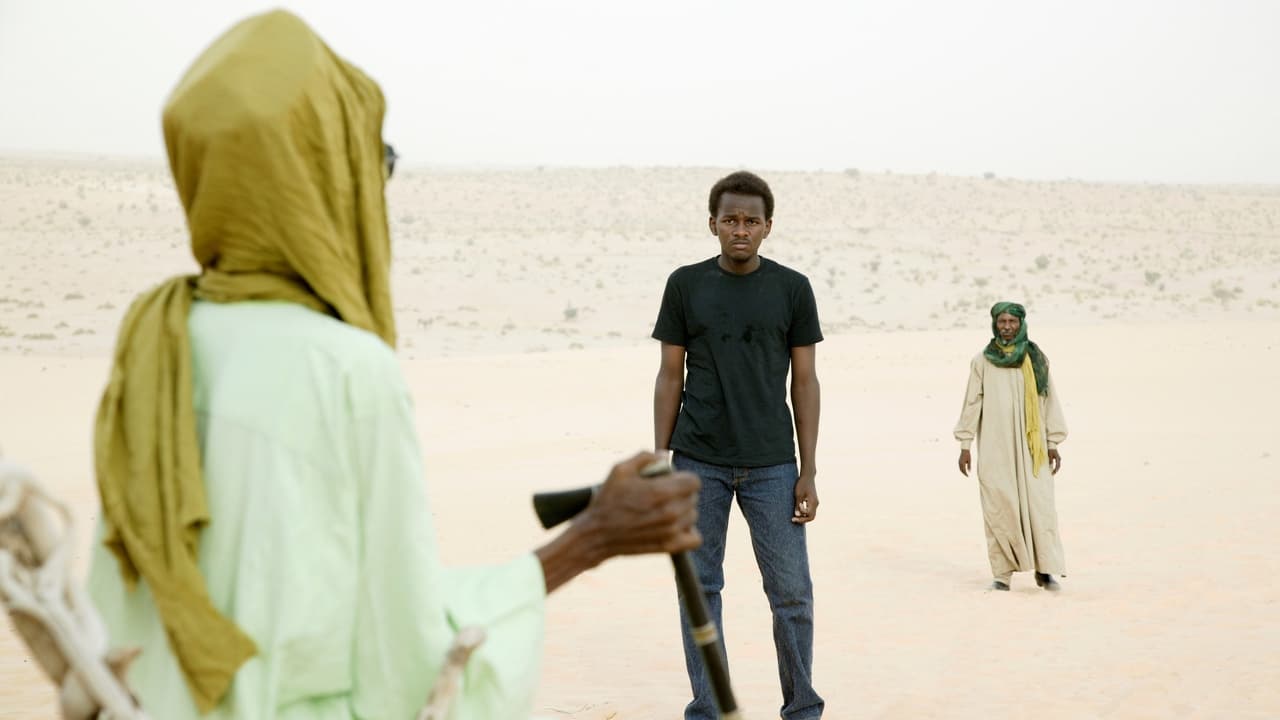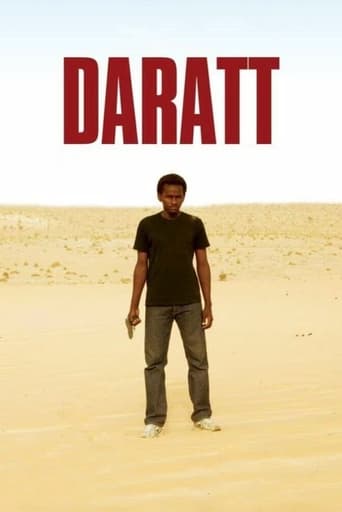

The Chadian film Daratt was shown in the U.S. with the title Dry Season (2006). It was written and directed by Mahamat-Saleh Haroun.This powerful movie begins with what clearly is a bitter blow for people who have suffered during Chad's long civil war. All war criminals are amnestied. There is no justice for people who have suffered horribly. The young protagonist, Atim (Ali Barkai) is given a pistol, and is told by his grandfather that now revenge is up to him. He must find and kill the man who killed Atim's father. Atim travels to the capital, N'Djamena. He finds the killer, Nassara (Youssouf Djaoro) and actually begins to work for him as a baker. Atim has ample opportunity to kill Nassara. However, just as Hamlet hesitates, Atim hesitates. Nassara has reformed. He begins each day by giving bread to poor children. He has married a beautiful young wife, who is pregnant. (The wife, Aicha, is portrayed by Aziza Hisseine.) Naturally, Atim falls in love with her. Atim hesitates, and we all wait to see what will happen next.As I wrote in my review of another film from Chad, Abouna, "This movie is worth seeing on its own merits. That fact that it's from Chad makes it even more important to view it. If I counted correctly, less than a dozen films have been made in Chad. The superb Dryden Theatre at The George Eastman Museum in Rochester is showing five of these movies as part of a Haroun retrospective. My compliments to the Dryden for giving us the opportunity to see these films on the large screen.Some of Haroun's films are available for the small screen, but some are not. Also, even with the resources of the Eastman Museum, a print of "Bye Bye Africa" couldn't be located. (If you know someone who has a print of that movie, please notify the Dryden Theatre.)"Daratt is a very powerful film, and I highly recommend it. It's unlikely that you'll be able to view it on the large screen, but it's available on DVD. Find it and see it.
... View Moreperhaps the stereotypes of Americans being impatient with storytelling and in need of action is true. i found myself perpetually bored by this film. this in and of itself would not be such a bad thing, lots of film bore me. but this one actually has some decent storytelling to it. the problem comes from a lack of willingness to edit down the film, to move things along. too many shots of characters sitting around looking as if they are waiting to be filmed or photographed, glances caught at some distant nothing. mock modeling sessions for calvin klein ads. shots that consist of little more than a character walking across the frame. some tighter editing would have brought this same story in at around 45 to 50 minutes and would have lost nothing but fillers and time killers.
... View MoreMahamat-Saleh Haroun's story is remarkable in it's starkness of setting - the desert of Chad - and in the manner in which it unfolds. This is a two-hander in which there is very little dialogue - one can't talk and the other won't. This creates an almost surreal element to the film, where hatred seethes through silent glares.When the Chad Commission for Truth and Justice grants amnesty to some 200 war criminals, the elderly Gumar Abatcha gives his dead son's pistol to his orphaned grandson Atim and dispatches him to kill the murderer of Atim's father. Living far away, Nassara is a dangerous man who now ekes out a living as a baker, trying to forget his past. When Atim finds him, he insinuates himself into Nassara's life with the intent of exacting revenge. Dry Season would make an excellent companion film to Death and the Maiden (1994), Roman Polanski's thrilling film version of a play about political repression and revenge in Central America.I find it unfortunate that we have to wait for festivals to see films like this (I saw it at the Melbourne International Film Festival). It depicts a culture we know virtually nothing about, is visually stunning and was thoroughly engaging. An excellent film.
... View MoreLike Koreeda's 'Hana', Haroun's 'Daratt' is another new filmed tale about delayed revenge, but a very different one. Atim (Ali Barkkai), whose father was murdered in the aftermath of Chad's civil war, goes out to avenge his father's killer after a general amnesty is declared. His plans change when in order to carry out his task he goes to work at the killer's bakery. While Koreeda's Soza is timid and doubtful and lives with a lot of other people, Atim is virtually alone and perpetually angry and seems ready to kill at any moment.'Revenge is a dish best enjoyed cold' means it's not a crime of passion but of premeditation. Into that premeditation play not only a personal sense of wrong but often hereditary cultural rules governing loyalty to tribe, clan, family, or parent. It seems unlikely anyone would feel obligated to carry out an act of revenge (as both Soza and Atim do) without cultural input requiring it; and since traditional values are in a state of flux or devolution, the motivation may wane. This must explain the arcs of both 'Hana' and 'Daratt'. Soza of 'Hana' feels an obligation to his clan, which however his own nature rejects; he's a gentle soul who would rather teach calligraphy than practice his dubious swordsmanship skills -- which don't seem to translate well from the dojo to the street. Atim is directed by his ancient, blind grandfather to avenge his father's death. It seems almost a religious duty, and in some folk interpretations of Islam such obligations are given a religions sanction. In fact, though, when Atim arrives at the unidentified town where his "victim" lives and begins working for his father's killer, he refuses to go to the mosque with him, perhaps sensing that subjugation to the will of God might dampen his sense of purpose, or because he realizes his bloody mindedness ill fits a religion whose greeting is "peace be upon you." 'Daratt's' fable-like quality arises from its forceful simplicity. Each character has some iconic function. Atim's grandfather Gumar Abatcha (Khayar Oumar Defallah) acts as a relentless force of judgment. The soldier who is nasty to Atim on his trip (Abderamane Abakar) is a minor wrong-doer, who disrespects Atim, which also must be avenged. Upon arrival Atim's befriended by an amiable petty thief, Moussa (Djibril Ibrahim), who helps him get established in town, but whom he summarily abandons once he narrows in on his task. When we first see Nassara (Youssouf Djaoro), the man who killed Atim's father, it's obvious he is more important. He looks like a priest. He is a tall, thin man in a robe with a scarf around his neck and a distant, ascetic air -- off-putting, but not easy to despise on sight -- and he appears at a gate with a bag full of bread scraps that he distributes to poor boys who come to him with tin plates. This happens several times, and then Atim goes up to Nassara. Everything about Atim from first to last suggests inarticulate rage. One would say his performance was one-note were it not so strong and convincing. He takes the proffered hunk of bread, bites out of it, then spits it out. The man says if he wants work, to come back tomorrow. Nobody talks much in the film. In fact Nassara has had his throat slit during the war and has to hold a gadget up to his neck to be able to say anything.The strength of the film comes from its tension and suspense, from the accumulating power of things left unexplained. It is never obvious, right up to the last scene, what Atim is going to do. When he stays with Nassara and is befriended uneasily by his young wife Aicha (Aziza Hiseine) and begins to work for him, it's not clear why. Is he biding his time to achieve maximum surprise? Or is he simply hesitating? Moreover while evidently Nassara is becoming fond of the young man, it's hard to say whether Atim is liking him more or feeding his hate. Certainly the situation is complicated by the fact that in some strange way Nassara has become a surrogate father figure for Atim (an outcome recalling events in the Dardennes brothers' 'The Son'), but also because, when Nassara's back is killing him and he lets Atim do all the baking, it delights Atim to accomplish this task with success. Nassara like Atim is silent and seems full of anger, further linking the two men, young and old, in an uneasy embrace. One of the most vivid ever portraits on film of prolonged, inarticulate rage, 'Daratt' is also a more emotionally intense and convincing depiction than Koreeda's 'Hana' of how someone bent on revenge might waver painfully over the task.'Daratt' is a fascinating, powerful tale. Its intensity, its vividness, its simplicity, even the dry heat of the setting, all conspire to make for a riveting film.Shown as part of the San Francisco International Film Festival 2007.
... View More